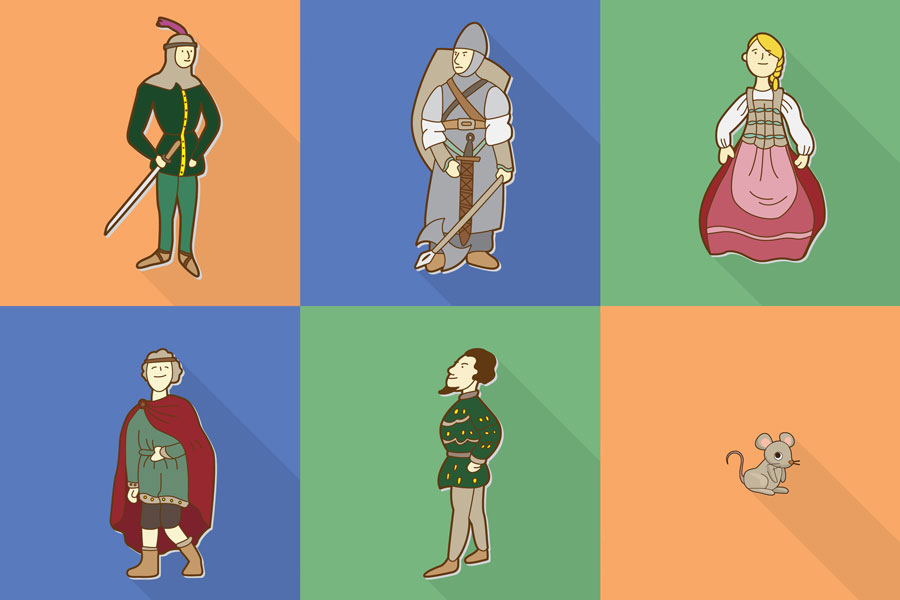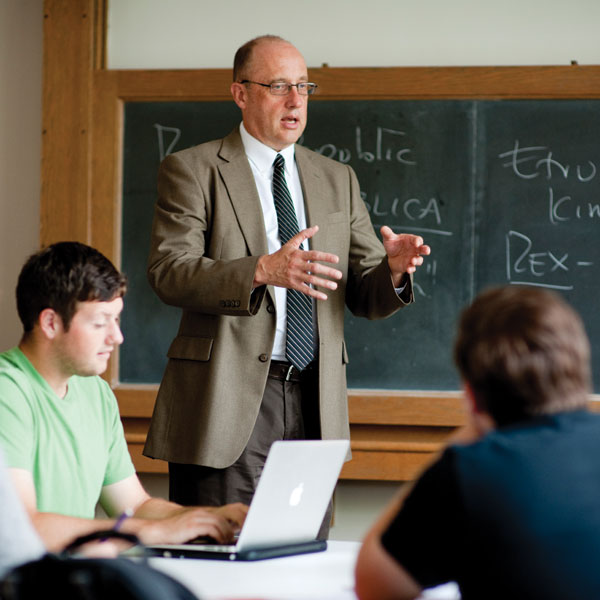LIFE OF THE MIND
Mice in the Middle Ages
History professor Timothy Thibodeau explores what medieval Church documents tell us about everyday life in the 13th century
by Robyn Rime

Just in case you wanted to know: if a mouse nibbles on a consecrated host, it ceases to be a consecrated host.
That’s on the authority of Pope Innocent III, who decreed the doctrine of transubstantiation in 1215. And although you may not have wondered about nibbling mice, church-goers in the 13th century definitely did, says Professor of History Timothy Thibodeau, Ph.D., an expert on the religion and culture of Europe in the Middle Ages.
Thibodeau paints a robust picture of medieval culture in his most recent paper, The Spider in the Chalice: Rethinking the Liturgy in the Age of Scholasticism with William Durand of Mende’s (c. 1230–1296) Mass Commentary, which he delivered in October at the annual conference of the New York State Association of European Historians. Writers of church doctrine didn’t address everyday topics like mice unless someone raised the issue in the first place, explains Thibodeau. Clerical teachings handed down by the Church often lived side by side with the earthy or even exotic concerns of ordinary people; “sublime theological rumination is merged with the mundane problems of Eucharistic hygiene.” Close examinations of those teachings from the Middle Ages can give historians a clearer picture of the concerns of typical church-goers and open a window into 13th-century culture.
That cultural window is important, says Thibodeau, because it had been closed by scholars of Church history until recently.
Thibodeau’s paper points out that Durand, Thomas Aquinas, and other contemporaries in liturgical commentary produced “calmly constructed, lengthy discussions of mice that eat consecrated hosts or spiders that fall into consecrated chalices juxtaposed with Aristotelian explications of the moment of consecration on the altar.” Durand, a French bishop, was one of the most notable men to come out of the Age of Scholasticism, the intellectual movement in the 12th and 13th centuries that celebrated critical thought. Scholasticism was held up by the Catholic Church during the tumult of the Reformation, the Scientific Revolution, and the Enlightenment as a “golden age” of religious faith and rationalism.
But the way Scholasticism was appropriated by the Church turned clerical doctrine into something no longer rooted in everyday life, contends Thibodeau; the official doctrine lost the cultural context for its intellectual ideas. Thibodeau searches for mice and other evidence of everyday life in medieval documents to help restore that context—how the culture of the time, the realities of the world in which people lived, affected their ideas.
“Historians of religious belief and practice have to move way beyond official doctrines of the Church and examine the broader cultural contexts that led to the formulation of these dogmatic teachings,” explains Thibodeau. “In that sense, what we call ‘pop culture’ does play a role in the formation of institutional religious identity and formal teaching. Even in the erudite literature of the 13th century, everyday life creeps in.”
Why does this matter to 21st-century historians? Thibodeau contends that our everyday interests aren’t a lot different today, although mice in the communion host may not be our first concern. Even with modernity’s astounding technology, high levels of education, and supposed cultural sophistication, Americans are still drawn to the strange and bizarre—just like people were in medieval Europe.
“I tell students if they want to get a good grip on American society, they probably shouldn’t be reading the New England Journal of Medicine,” Thibodeau concludes. “They should read The National Enquirer instead.”
Dr. Timothy Thibodeau is a professor of history at Nazareth and the immediate past president of the New York State Association of European Historians.
Robyn Rime is the editor of Connections.
